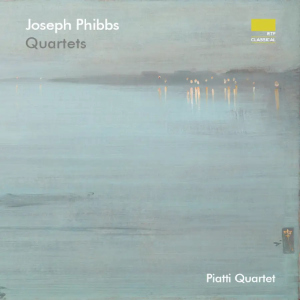
Joseph Phibbs (b. 1974)
String Quartet No.2 (2014)
String Quartet No.3 (2018, rev. 2021)
String Quartet No.4 (2024)
Piatti Quartet
rec. 2023/2024, London, UK
Nimbus Records Alliance NI6452 [56]
Phibbs was born in London and his teachers included Harrison Birtwistle and Steven Stucky. He was a winner of the BBC Young Composers’ Forum in 1996 and has gone to write a good deal to BBC commissions. Although a number of his works have been recorded, they have been mostly on discs shared with other composers; this seems to be the first disc devoted solely to his music. It is also the first I have heard of his work.
To date Phibbs has written four string quartets. He has enjoyed a long association with the Piatti Quartet, who recorded his first quartet on another disc with works by Britten, Bridge and Turnage called Albion Refracted, which was received warmly by MWI (review). Here we have the next three. His idiom is tonal, approachable and so close to that of Britten that at moments I could imagine his quartets taking on passages from Britten’s quartets. However, Phibbs’s quartets are not pastiche: he is his own man, and he has a vein of poignant lyricism which is entirely his own. The other influence I would note is that by Bartók, not surprising in any quartets written since his, in the structure of two of these works and in one movement in particular.
Quartet No.2 is short, written in the traditional four movements. The opening Presto features high twitterings alternating with pizzicato interjections which culminate in a strong melody. Another fast movement follows, restless and unsettled, in a fugal texture with many short motifs. There is then an Interlude marked Chitarra, i.e. a guitar, which is evoked at the beginning. The final Lento affetuoso is the longest movement and is meditative and sombre though it gradually ascends to the light.
Quartets 3 and 4 have in common that they are each in five movements, following the arch scheme pioneered by Bartók. In Quartet No. 3 it is the first movement which is the longest; it alternates slow and fast passages and has the subtitle Illuminations, referring both to city lights and to Britten’s song cycle of that name. The second movement is fast and insistent. The central slow movement is titled Notturno e fantasia, with a central fast section; the slow passages remind me of Bartók’s night music idiom. There follows a kind of minuet gone wrong, and the finale is a slow vocalise.
Quartet No 4 has a similar structure though here it is the finale which is the longest movement. The opening movement is titled Film Sequence, with a variety of themes over repeating notes. The very short Notturno explores one brief motif. There is then a lyrical Cantilena, a Burlesque which is a kind of folk dance, and a final Passacaglia which is somewhat melancholy, though occasionally protesting.
I really enjoyed these quartets and look forward to hearing more of Phibbs’s music: it is the kind of unshowy, well-composed and memorable writing which doesn’t grab attention but rewards it. The Piatti Quartet repay the composer’s confidence in them with strong and committed performances, and the recording is excellent. Those who care for string quartets should explore these works.
Stephen Barber
Previous review: Rob Barnett (October 2024)
Buying this recording via a link below generates revenue for MWI, which helps the site remain free




















